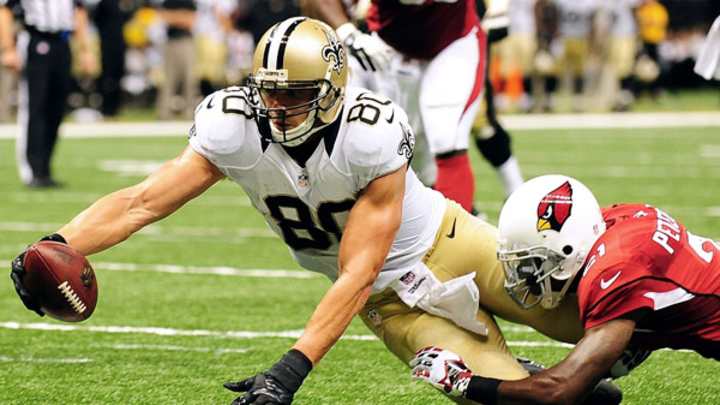Saints' decision to tag Jimmy Graham could bring re-definition of positional value

When it comes to fair compensation, Jimmy Graham may be stuck short of the goal line. (Stacy Revere/Getty Images)
According to ESPN.com's Adam Schefter, the New Orleans Saintsare prepared to place the franchise tag on tight end Jimmy Graham by Monday's deadline, and that move could set off a historic series of events that could decide how hybrid players are paid in the future. (UPDATE: Graham confirmed that he was hit with the franchise tag Friday, tweeting "TAG ... I guess I'm it..." )
Schefter was told by a source that Graham will be franchised as a tight end, which will guarantee him somewhere in the neighborhood of $6.7 million in 2014. Graham and his agent, Jimmy Sexton, want Graham to be tagged at the rate for receivers, which would almost double his 2014 guarantee at a projected rate of $11.5 million. And if the Saints, who are projected to be $7.1 million below the cap, decide to ignore that edict, Sexton will file a grievance with the Players' Association. The claim will be that because Graham was lined up in the slot or flexed out wide 67 percent of the time in 2013, he should be tagged as a receiver -- because that's how the Saints used him, position name be damned.
Graham was also one of the NFL's best deep threats in 2013, regardless of position. He caught eight passes of 20 yards or more last season on 18 targets for 321 yards and five touchdowns. Philadelphia's DeSean Jackson, the league's best overall deep receiver in 2013, caught 16 such passes on 33 targets for 553 yards and eight touchdowns. And only Tony Gonzalez and Jason Witten had more slot targets than Graham's 67, per Pro Football Focus. So, depending on how the NFL and NFLPA want to deal with players who have multiple roles, Sexton could take his entirely feasible case in front of a panel and win -- which would change the game in a lot of ways.
MORE COVERAGE: New Orleans Saints Mock Draft Tracker| 2014 NFL Draft Big Board
Graham isn't the first tight end to take issue with the ways in which people at the position are paid. In 2012, agent Blake Baratz, who represented Jermichael Finley in his contract talks with the Green Bay Packers, put forth the same argument -- his client was not a traditional tight end, and he shouldn't be compensated as such. Finley lined up 152 times as a receiver in 2011, according to Football Outsiders, and Baratz said that this eliminated the usual designation.
"I could see an arbitrator looking at it a lot of different ways," Baratz told TheMMQB's Greg Bedard in July 2012, back when Bedard wrote for the Boston Globe. "The team is going to argue it doesn’t matter where the guy lines up and what he does, he’s a tight end. Our argument was, when you make an argument on where they are lining up, what kind of stance they’re in, whether they’re running routes and the percentages, that Jermichael was doing that. To me, that’s no different than if Wes Welker is in the slot or [Packers receiver] James Jones is in the slot."
At that time, the franchise tag for tight ends was $5.446 million, and the amount for receivers was $9.515 million. In the end, the Packers split the difference, giving Finley a two-year deal worth about $15 million. Finley received $5.75 million in base salary in 2012, and a $4.45 million roster bonus at the start of the 2013 league year that would give him $8.25 million in the second year of the deal. Finley suffered a bruised spinal cord in November of last year and was done for the season.
Still, Baratz believed that he had a winning argument -- and he could well have been right.
“We looked very heavily into it,” he told Bedard back then. “We did a full 50-page argument, which we firmly believed was a very sound argument. Now, whether we were going to win or not, I have no idea. And I don’t think the team did and the league certainly didn’t because it was unprecedented.
...
"The team’s going to say he was a tight end in college, he sits in the tight end meeting room, and he’s a tight end in the media guide, and on websites he’s a tight end. That’s all great, but our argument was what’s the definition of a tight end? To us, [that] says he plays tight to the end, which is the traditional definition.”

SI.com contributing NFL writer and Seattle resident Doug Farrar started writing about football locally in 2002, and became Football Outsiders' West Coast NFL guy in 2006. He was fascinated by FO's idea to combine Bill James with Dr. Z, and wrote for the site for six years. He wrote a game-tape column called "Cover-2" for a number of years, and contributed to six editions of "Pro Football Prospectus" and the "Football Outsiders Almanac." In 2009, Doug was invited to join Yahoo Sports' NFL team, and covered Senior Bowls, scouting combines, Super Bowls, and all sorts of other things for Yahoo Sports and the Shutdown Corner blog through June, 2013. Doug received the proverbial offer he couldn't refuse from SI.com in 2013, and that was that. Doug has also written for the Seattle Times, the Washington Post, the New York Sun, FOX Sports, ESPN.com, and ESPN The Magazine. He also makes regular appearances on several local and national radio shows, and has hosted several podcasts over the years. He counts Dan Jenkins, Thomas Boswell, Frank Deford, Ralph Wiley, Peter King, and Bill Simmons as the writers who made him want to do this for a living. In his rare off-time, Doug can be found reading, hiking, working out, searching for new Hendrix, Who, and MC5 bootlegs, and wondering if the Mariners will ever be good again.